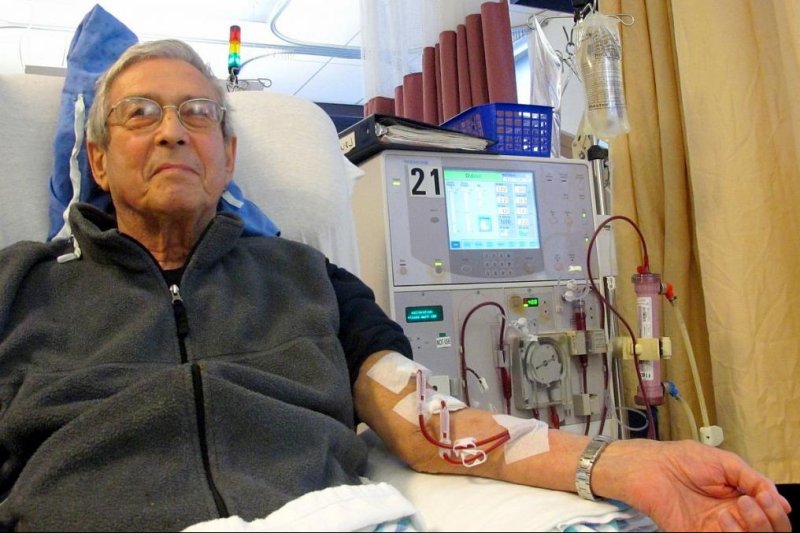In chronic cases of nephritis, patients often have kidney failure and need dialysis in chronic cases. Using a man-made version of a human antibody, a targeted drug can reverse nephritis. Photo by
Anna Frodesiak/Wikimedia Commons
July 30 (UPI) -- A manmade version of a human antibody helped inhibit a chronic inflammation called nephritis that often leads to kidney failure and dialysis, according to a study.
Researchers at the Medical College of Georgia at Augusta University successfully delivered the drug to kidneys to restore the function in kidney cells, called mitochondria, which are affected by the acute or chronic inflammation. Their findings were published last week in the journal Kidney International
"We are delivering something to the kidney that is reducing inflammation and restoring mitochondrial function," corresponding author Dr. Michael P. Madaio, and nephrologist and chairman of the Department of Medicine at the Medical College, said in a press release. "We are helping the mitochondria be a little healthier and the kidney cells function better."
Nephritis, which affects kidneys and the million filtering units in each one, can cause a serious infection or injury as well as diseases that include uncontrolled hypertension and diabetes.
Patients often have kidney failure and need dialysis in chronic cases.
Treatment now includes systemic high-dose steroids to battle inflammation and systemic immunosuppressive drugs, including those taken by transplant patients. But there was increased risk of infections, and even cancer.
Researchers studied immune-mediated nephritis in mice. A single dose of the protein kinase C-alpha inhibitor was injected a few days later.
They recovered kidney function and survived.
Researchers also found it was successful in endothelial cells that line the filtering units.
A proteomic analysis determined that 157 proteins were significantly altered with the mitochondria most affected.
After using just a small dose of the whole human antibody, researchers hope to use a physically smaller, non-inflammatory version of their manmade antibody, called a minibody. It can then deliver multiple drugs.
The antibody is produced in Goodpasture syndrome, a rare kidney disease that rapidly progresses and is difficult to treat because it inflames and scars the kidneys and can quickly destroy the organs.
Although antibodies usually promote inflammation, the investigators reached the kidneys for the opposite effect. The antibody's natural target, or antigen, is normally sequestered in the kidneys,
but its role in this targeted delivery system works during inflammation, Madaio says.
Researchers also are already exploring other drugs for potential delivery.
In addition, Madaioi believes the system can also work well for common kidney diseases like diabetic nephropathy, which can accompany type 1 and 2 diabetes.
He said the discovery that mitochondria play a role in recovery was of particular interest.
"Using the whole animal approach, we can look at both inflammation and recovery as they happen, however we can more precisely hone in on the mechanisms with kidney cell culture," Madaio said. "Then when you dig out a mechanism in the cell, you can go back to the animal model to test to see how relevant that is to the disease."















